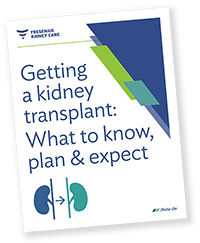Knowing What to Expect After Your Kidney Transplant
Like almost any surgical procedure, kidney transplant surgery requires a period of healing and recovery. During the post-transplant phase, you’re likely to have a whole range of feelings, both physical and emotional, as your body adjusts to a new organ and new medications. You will also have a self-care regimen to follow in order to make sure you don’t compromise your new kidney or your health.
Given all of these changes, it’s important to be prepared and educate yourself about life immediately after surgery and in the weeks, months, and years to follow. Knowing what to expect after a kidney transplant can help make the post-surgery period easier to navigate.
Given all of these changes, it’s important to be prepared and educate yourself about life immediately after surgery and in the weeks, months, and years to follow. Knowing what to expect after a kidney transplant can help make the post-surgery period easier to navigate.
After Transplant Surgery
Now that you’ve gotten through your transplant surgery successfully, the most important step is to rest and take care of yourself so you can go home and recover completely.
Immediately after kidney transplant surgery you can expect:
- Soreness in your abdomen.
- To remain hospitalized while your doctor and care team monitor your status.
- To be on immunosuppressant drugs to keep your body from rejecting your kidney.
- To take other medication to reduce the risk of infection and other complications.
After you’re discharged, you will need:
- Regular checkups for a few weeks. You may also need to arrange for living accommodations, depending how far you live from your transplant center.
- Regular monitoring of your new kidney.
- Daily medications to prevent organ rejection.
Managing emotions after a transplant
Most people are so focused on how they’re feeling before a transplant, they don’t realize that they may experience a range of new emotions after a kidney transplant. Post-surgery medications may affect your moods, and some people experience guilt, anxiety, or stress while they adjust. You should know that these feelings are normal, and your care team is there to support you. Call on them anytime to make sure your emotional needs are being addressed.
Life with Your New Kidney
As you recover from surgery and adjust to your new kidney, you can expect to have more energy, an improved quality of life, and, potentially, a positive change in your mood and outlook. Of course, looking after your health will be as important as ever.
Staying healthy with your new kidney
Your transplant care team will give you detailed instructions on how to take care of yourself and your new kidney. The following are some important ways to look after your post-transplant health:
- Take medications exactly as directed. Talk to your transplant team about tips for taking medications on time and properly.
- Protect your overall health. Anti-rejection medications suppress your immune system, making it harder to fight off illnesses. Wash your hands often, use hand sanitizer, and avoid being close to sick people.
- Share changes in your health with your care team. Tell your doctor immediately if you have:
- Wounds or sores that won’t heal.
- Signs of a urinary tract infection, including frequent urge to urinate, burning or pain during urination, or discolored or off-smelling urine.
- Symptoms of a respiratory infection, including fever, cough, nasal congestion, or sore throat.
- Maintain a healthy weight. Weight gain can be common after a transplant. Work with your dietitian to create a healthy diet plan. Controlling your weight can help you stay healthier overall.
- Look after your wellbeing. Find healthy ways to manage stress and embrace the things you like to do. Spending time with friends and family can be fulfilling and give loved ones an opportunity to support you.
- Follow your transplant care team’s instructions. Your care team is a group of experts who will instruct you on staying healthy after a kidney transplant. If you have questions about making healthy choices, ask your transplant care team.
What to Do if My Kidney Fails
Fortunately, the success rate for kidney transplantation is high. According to the Scientific Registry of Transplant Recipients:
- 97% of kidney transplants are working one month after surgery
- 93% are working at the end of one year
- 83% are working at the end of three years.
Reasons for kidney transplant failure
As encouraging as these numbers are, unsuccessful transplants do happen, and your care team will cover this possibility in detail during your evaluation. Some of the factors that can lead to a failed kidney transplant include:
While most of these occurrences are beyond your control, some can be prevented by following the advice of your care team. Take your medications as prescribed and communicate with your care team immediately about any changes in your health.
- Blood clotting
- Fluid around the new kidney
- Infection
- Certain medications
- Problems with the donor kidney
- Poor post-transplant care
- Not taking anti-rejection medication
- Organ rejection
- Recurring kidney disease
While most of these occurrences are beyond your control, some can be prevented by following the advice of your care team. Take your medications as prescribed and communicate with your care team immediately about any changes in your health.
Caring for yourself after transplant failure
Looking after your wellbeing is important in the case of a kidney transplant failure. There is no one way to feel or react—it’s completely normal to experience a range of emotions, including loss, shock, frustration, and/or disappointment. Work with your transplant care team to make sure you’re getting the right care—emotionally and physically.
Managing Costs After a Kidney Transplant
Along with the joys and responsibilities of having a new kidney, you may also have some concerns about managing your finances. If you’re having trouble affording your post-transplant medications, there are programs and organizations that may be able to help.
Assistance may also be available through your state or even the drug companies that make your medications. Talk to your social worker about your options.
Receiving a kidney transplant has a major impact on your physical and emotional wellness, your day-to-day routine, and more. It’s exciting to think about all the changes that could be coming your way, and it’s important to know how to best take care of yourself as you recover and adjust to life with a new kidney. If you’d like to learn more about what to expect throughout the kidney transplant process, download our free guide below.
- If you have Medicare you can apply for help through the Social Security Administration. Learn more at https://www.ssa.gov/benefits/medicare/prescriptionhelp/ or by calling (800) 772-1213.
- Other organizations that specialize in financial assistance for required medications include:
- The Partnership for Prescription Assistance: (888) 4PPA-NOW (888-477-2669) or https://medicineassistancetool.org/
- RxAssist Patient Assistance Program Center: https://www.rxassist.org/patients
Assistance may also be available through your state or even the drug companies that make your medications. Talk to your social worker about your options.
Receiving a kidney transplant has a major impact on your physical and emotional wellness, your day-to-day routine, and more. It’s exciting to think about all the changes that could be coming your way, and it’s important to know how to best take care of yourself as you recover and adjust to life with a new kidney. If you’d like to learn more about what to expect throughout the kidney transplant process, download our free guide below.
Suggested topics

“She just called me one day and said ‘Dad, I’m a match.’”
—Ron, received transplant in 2018
Watch Ron’s New Story
What Is a Kidney Transplant?
A kidney transplant, sometimes known as a renal transplant, is a treatment for kidney failure at end stage renal disease (ESRD). Kidney transplant surgery is a major surgery during which a person...

“I was able to receive the gift of life—a transplant—from my wife.”
—Sam, on home dialysis until transplant in 2010

